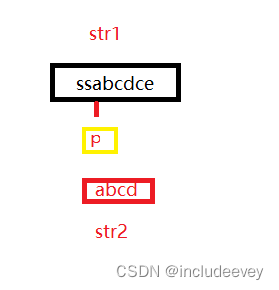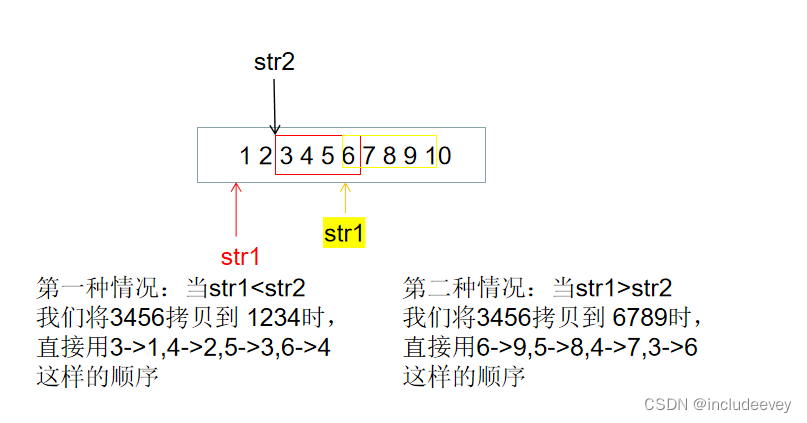目录
分类汇总
求字符串长度
strlen
长度不受限制的字符串函数
strcpy
strcat
strcmp
长度受限制的字符串函数
strncpy
strncat
strncmp
字符串查找
strstr
strtok
错误信息报告
strerror
字符操作,内存操作函数
memcpy
memmove
memset
memcmp
strlen的模拟实现
#define _CRT_SECURE_NO_WARNINGS
#include <stdio.h>
#include <assert.h>
//机器器方法
int my_strlen_1(const char* str)
{
assert(str);
int count = 0;
while (*str++)
{
count++;
}
return count;
}
//递归的方法
int my_strlen_2(const char* str)
{
assert(str);
if (*str)
{
return 1+ my_strlen_2(str+1);
}
return 0;
}
//指针的方法
int my_strlen_3(const char* str)
{
assert(str);
char* temp = str;
while (*str++)
{
;
}
return str - temp-1;
}
int main()
{
char arr[] = "asdlld";
int ret1 = my_strlen_1(arr);
int ret2 = my_strlen_2(arr);
int ret3 = my_strlen_3(arr);
printf("%d\n%d\n%d\n", ret1,ret2,ret3);
return 0;
}strcpy的模拟实现
#define _CRT_SECURE_NO_WARNINGS
#include <stdio.h>
#include <assert.h>
char* my_strcpy(char* des, const char* sou)
{
assert(des);
assert(sou);
char* ret = des;
while (*des++ = *sou++)
{
;
}
return ret;
}
int main()
{
char arr1[] = "abcdef";
char arr2[20] = { 0 };
my_strcpy(arr2, arr1);
printf("%s", arr2);
return 0;
}strcat的模拟实现
char* my_strcat(char* des, const char* sou)
{
assert(des&&sou);
char* ret = des;
while (*des++)
{
;
}
des--;
while (*des++=*sou++)
{
;
}
return ret;
}
int main()
{
char arr1[] = "abcdef";
char arr2[30] = "ahsjde";
my_strcat(arr2, arr1);
printf("%s", arr2);
return 0;
}
strcmp的模拟实现
#define _CRT_SECURE_NO_WARNINGS
#include <stdio.h>
#include <assert.h>
//int my_strcmp(const char* string1, const char* string2)
//{
// assert(string1&&string1);
//
// while (*string1 == *string2)
// {
// if (*string1=='\0')
// return 0;
// string1++;
// string2++;
// }
// if (*string1 > *string2)
// return 1;
// else
// return -1;
//
//}
//化简
int my_strcmp(const char* string1, const char* string2)
{
assert(string1&&string1);
while (*string1++ == *string2++)
{
if (*string1 == '\0')
return 0;
}
return *string1 - *string2;
}
int main()
{
char arr1[] = "abcdfe";
char arr2[] = "abcdcd";
int ret=my_strcmp(arr1,arr2);
if (ret > 0)
printf(" > ");
else if (ret < 0)
printf(" < ");
else
printf(" == ");
return 0;
}
strncpy的模拟实现
#include <stdio.h>
#include <assert.h>
char* my_strncpy(char* des, const char* src, size_t count)
{
assert(des&&src);
char* ret = des;
while (count && ((*des++ = *src++) != '\0'))
{
count--;
}
if (count)
{
while (count)
{
*des++ = '\0';
}
}
return ret;
}
int main()
{
char arr1[20] = {0};
char arr2[] = "abcdcd";
my_strncpy(arr1, arr2, 3);
printf("%s\n", arr1);
return 0;
}strncat的模拟实现
#include <stdio.h>
#include <assert.h>
char* my_strncat(char* dest,const char* src, size_t count)
{
assert(dest&&src);
char *ret = dest;
while (*dest)
{
dest++;
}
while (count&&((*dest++ = *src++)!='\0'))
{
count--;
}
if (count)
{
while (count--)
{
*dest++ = '\0';
}
}
return ret;
}
int main()
{
char arr1[20] = "shah";
char arr2[] = "abcdcd";
my_strncat(arr1, arr2, 3);
printf("%s\n", arr1);
return 0;
}
strncmp的模拟实现
#include<stdio.h>
#include<assert.h>
int my_strncmp(const char *str1, const char *str2, size_t count)
{
assert(str1&&str2);
while ((*str1 == *str2) && *str1 && (count--))
{
str1++;
str2++;
}
if (*str1 < *str2)
return -1;
else if (*str1 > *str2)
return 1;
else
return 0;
}
int main()
{
char *s1 = "abcd";
char *s2 = "abcc";
int ret=my_strncmp(s1, s2, 4);
if (ret > 0)
printf(">");
else if (ret < 0)
printf("<");
else
printf("==");
return 0;
}
strstr的模拟实现
strstr的模拟实现图

my_strstr的代码实现
#include<stdio.h>
#include<string.h>
#include<assert.h>
char* my_strstr(const char* str1, const char* str2)
{
assert(str1&&str2);
const char* s1 = str1;
const char* s2 = str2;
const char* p = str1;
while (*p)
{
s1 = p; //用来确定找到不同值之后返回的位置
s2 = str2;
while (*s1 && *s2 && *s1 == *s2)
{
s1++;
s2++;
}
if (*s2 == '\0')
{
return (char*)p;//接受类型为char*,p类型由const修饰,返回值强制类型转换为char*
}
p++; //重新确定起始位置
}
return NULL;//没有找到返回空指针
}
//如果s1==s2进入循环直到不等于,如果s2是等于'\0',那么证明已经s2已经循环完毕且每个是与s1的值相等,所以返回p指针
//如果进行之后不相等退出循环,指针p++,将新的起始赋予str1,若找到返回指针p,若没有找到继续循环到p指针为‘\0’,返回空指针
int main()
{
char *s1 = "ssabcdce";
char *s2 = "abcd";
char* ret=my_strstr(s1, s2);
if (ret == NULL)
{
printf("子串不存在\n");
}
else
{
printf("%s\n", ret);
}
return 0;
}strtok的模拟实现
strtok的举例使用
int main()
{
char arr[] = "zhangsan,lisi,ermazi";
char* ret;
ret = strtok(arr, ",");
printf("%s ", ret);
ret = strtok(NULL, ",");
printf("%s ", ret);
ret = strtok(NULL, ",");
printf("%s ", ret);
return 0;
}
my_strtok的实现代码:
char* my_strtok(char* str, const char* delim)
{
// 生成替换字符表
char table[256] = { 0 };
while (*delim != '\0')
{
table[*delim] = 1;
delim++;
}
// 使用 static 类型指针保存上一次函数调用时的字符串地址
static char* pstr = NULL;
if (str != NULL)
{
pstr = str;
}
// 保证 pstr 指向以非替换字符为首的子字符串
while (*pstr != '\0' && table[*pstr] == 1)
{
pstr++;
}
// ret 保存返回子字符串的首地址
char* rst = (*pstr != '\0') ? pstr : NULL;
while (*pstr != '\0')
{
if (table[*pstr] == 1)
{
// 切割得到子字符串,且 pstr 最后指向子字符串的下一字符
*pstr++ = '\0';
break;
}
else
{
pstr++;
}
}
return rst;
}
int main()
{
char arr[] = "zhangsan,lisi,ermazi";
char* ret;
ret = my_strtok(arr, ",");
printf("%s ", ret);
ret = my_strtok(NULL, ",");
printf("%s ", ret);
ret = my_strtok(NULL, ",");
printf("%s ", ret);
return 0;
}
strerror的使用
#include <errno.h>
int main()
{
printf("%s\n", strerror(0));
printf("%s\n", strerror(1));
printf("%s\n", strerror(2));
printf("%s\n", strerror(3));
printf("%s\n", strerror(4));
printf("%s\n", strerror(5));
//errno - C语言设置的一个全局的错误码存放的变量
FILE* pf = fopen("C:\\Users\\zpeng\\Desktop\\test.txt", "r");
if (pf == NULL)
{
printf("%s\n", strerror(errno));
return 1;
}
else
{
printf("yes!");
}
return 0;
}memcpy的模拟实现
#include<stdio.h>
#include<string.h>
#include<assert.h>
void* my_memcpy(void* str1,const void* str2, rsize_t n)
{
assert(str1&&str2);
void* ret = str1;
while (n--)
{
*(char*) str1 = *(char*) str2;
(char*)str1 += 1;
(char*)str2 += 1;
}
return ret;
}
int main()
{
int arr1[30] = { 0 };
int arr2[] = { 1, 2, 3, 4 };
my_memcpy(arr1, arr2,20);
for (int i = 0; i < 4; i++)
{
printf("%d", arr1[i]);
}
}memmove的模拟实现
memmove的模拟实现图

memmove的模拟实现代码
#include<stdio.h>
#include<string.h>
#include<assert.h>
void* my_memmove(void* str1,const void* str2, size_t n)
{
assert(str1&&str2);
void* ret = str1;
if (str1 < str2)
{
while (n--)
{
*(char*) str1 = *(char*) str2;
(char*)str1 += 1;
(char*)str2 += 1;
}
}
else
{
while (n--)
{
*((char*)str1+n) = *((char*)str2+n);
}
}
return ret;
}
int main()
{
int arr1[] = { 1, 2, 3, 4 };
my_memmove(arr1, arr1+2,8);
for (int i = 0; i < 4; i++)
{
printf("%d", arr1[i]);
}
}memset的模拟实现
#include<stdio.h>
#include<string.h>
#include<assert.h>
void *my_memset(void *dest,const int c, rsize_t n)
{
assert(dest);
char *pdest = (char *)dest;
while (n--)
{
*pdest++ = c;
}
return dest;
}
int main()
{
char arr1[] = "hello world ";
int ret=strlen(arr1);
my_memset(arr1, 1, ret);
for (int i = 0; i < ret; i++)
{
printf("%d", arr1[i]);
}
}mencmp的模拟实现
int my_memcmp(const void* str1, const void* str2, size_t count)
{
assert(str1 && str2);
const char* s1 = (const char*)str1;
const char* s2 = (const char*)str2;
int ret = 0;
while (count--)
{
if ((ret = *s1 - *s2) != 0)
break;
s1++;
s2++;
}
return ret;
}
int main()
{
int a[] = { 1, 2, 3, 4, 5 };
int b[] = { 1, 2, 4, 3, 5, 6 };
int ret = my_memcmp(a, b, sizeof(int)* 5);
if (ret > 0)
printf(">");
else if (ret < 0)
printf("<");
else
printf("==");
}